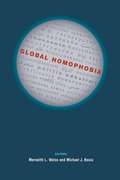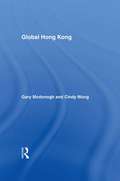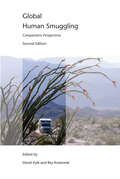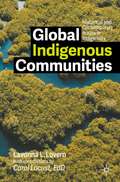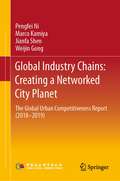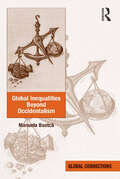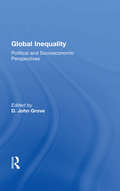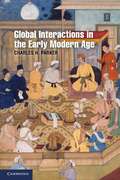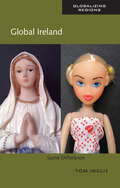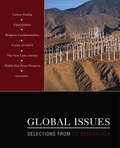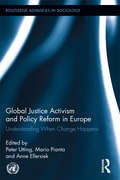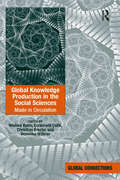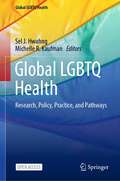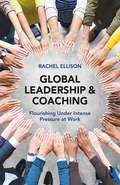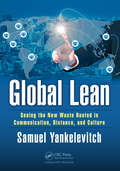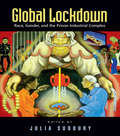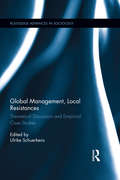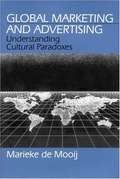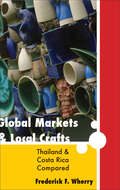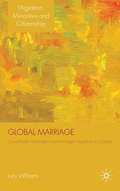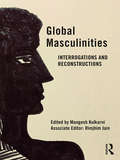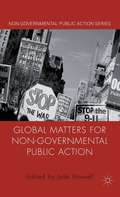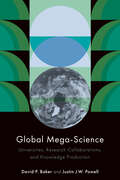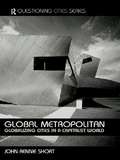- Table View
- List View
Global Homophobia: States, Movements, and the Politics of Oppression
by Michael J. Bosia Meredith L. WeissWhile homophobia is commonly characterized as individual and personal prejudice, this collection of essays instead explores homophobia as a transnational political phenomenon. Contributors theorize homophobia as a distinct configuration of repressive state-sponsored policies and practices with their own causes, explanations, and effects on how sexualities are understood and experienced in a range of national contexts. The essays include a broad range of geographic cases, including France, Ecuador, Iran, Lebanon, Poland, Singapore, and the United States.
Global Hong Kong (Global Realities #Vol. 2)
by Gary McDonogh Cindy WongGlobal Hong Kong locates Hong Kong in the contemporary globalizing world. Hong Kong, as the authors argue, is an archetypal place, sitting at the intersection of East and West. It is also a major center for global capital flows and world trade. Moreover, in recent years, the island's global cultural power has become increasingly evident, as Hong Kong popular culture has spread to the West via a booming film industry. While looking at issues of postcoloniality, transnationalism and economic globalization, Wong and McDonogh focus on the new cultures and social formations of contemporary Hong Kong, as well as the transformation of the physical city itself. They also trace the new interconnections - economic, demographic, social and cultural - between Hong Kong and other parts of the worldthat have benn fostered by globalization.Books in this series look at how nations and regions across the world are navigating the tumultuous currents of globalization. Concise, descriptive, interdisciplinary, and theoretically informed, they serve as ideal introductions to the peoples and places of our increasingly globalized world.
Global Human Smuggling: Comparative Perspectives
by David Kyle and Rey KoslowskiTen years ago the topic of human smuggling and trafficking was relatively new for academic researchers, though the practice itself is very old. Since the first edition of this volume was published, much has changed globally, directly impacting the phenomenon of human smuggling. Migrant smuggling and human trafficking are now more entrenched than ever in many regions, with efforts to combat them both largely unsuccessful and often counterproductive. This book explores human smuggling in several forms and regions, globally examining its deep historic, social, economic, and cultural roots and its broad political consequences.Contributors to the updated and expanded edition consider the trends and events of the past several years, especially in light of developments after 9/11 and the creation of the U.S. Department of Homeland Security. They also reflect on the moral economy of human smuggling and trafficking, the increasing percentage of the world's asylum seekers who escape political violence only by being smuggled, and the implications of human smuggling in a warming world.
Global Indigenous Communities: Historical and Contemporary Issues in Indigeneity
by Lavonna L. LovernGlobal Indigenous Communities is a wide-ranging examination of global Indigenous communities that continue to suffer from colonization and assimilation issues, including intergenerational trauma. The scholarship is interdisciplinary; it is not easily categorized as sociology, anthropology, ethnography, or philosophy, but cuts across all of these disciplines, as well as Indigenous methodologies. The book not only presents an academic study of Indigenous issues, covering Indigenous community life, religion, the environment, economic matters, education, and healthcare, but also incorporates contributions from Carol Locust, EdD, that reflect on her lifetime of experience in Indigenous education and healthcare. Each studied prism of Indigenous life is revealed to be impacted by the experience of intergenerational trauma that results from continued colonization. Ultimately, this book aims to bridge the communication gap between Western and Indigenous scholarship and readership, artfully combining Indigenous approaches with a traditional academic style.
Global Industry Chains: The Global Urban Competitiveness Report (2018–2019)
by Pengfei Ni Jianfa Shen Marco Kamiya Weijin GongThis report presents the outcomes of a survey project of the National Academy of Economic Strategy of the Chinese Academy of Social Sciences and the United Nations Human Settlements Programme. The project evaluated and ranked the competitiveness of 1,007 global cities, with a combined population of over 500,000, based on a number of selected indicators. The report provides an overview of the global urbanization pattern and areas of improvements in the selected cities. The outcomes of the project confirm that the formation and changes of global value chains have caused profound changes in economic structures in some countries and affected the development of cities in these countries, thereby reshaping the city planet.In addition to comparative analysis of competitiveness of cities, this report also sheds light on the global pattern and trends of economic and human development. It reveals four new findings regarding the development of cities around the world: First, over the past four decades, human societies are transitioning quickly from agricultural societies which are characterized by scattered settlements to industrial societies which are characterized by city clusters, interconnectivity, and resource sharing. The planet where we are living has become a city planet. Second, globalization and the advancements of smart and networking technologies have accelerated urbanization across the world in the past four decades. Third, cities are becoming increasingly metropolitan, interconnected, and smart. Fourth, sustainability scores of the selected global cities show olive-shaped distribution on the world map and sustainability performance of Asia cities has improved continuously.
Global Inequalities Beyond Occidentalism (Global Connections)
by Manuela BoatcăBased on theoretical developments in research on world-systems analysis, transnational migration, postcolonial and decolonial perspectives, whilst considering continuities of inequality patterns in the context of colonial and postcolonial realities, Global Inequalities Beyond Occidentalism proposes an original framework for the study of the long-term reproduction of inequalities under global capitalism. With attention to the critical assessment of both Marxist and Weberian perspectives, this book examines the wider implications of transferring classical approaches to inequality to a twenty-first-century context, calling for a reconceptualisation of inequality that is both theoretically informed and methodologically consistent, and able to cater for the implications of shifts from national and Western structures to global structures. Engaging with approaches to the study of class, gender, racial and ethnic inequalities at the global level, this innovative work adopts a relational perspective in the study of social inequalities that is able to reveal how historical interdependencies between world regions have translated as processes of inequality production and reproduction. As such, it will be of interest to scholars of sociology, political and social theory and anthropology concerned with questions of globalisation and inequality.
Global Inequality
by D. John GroveRedistribution of the world's wealth, not only among nation. states but among cultural, class, and sexual groups, has become increasingly a major issue of concern. This book examines existing inequality in both the domestic and international arenas. Its multidisciplinary approach facilitates an understanding of the complex structure of global distr
Global Interactions in the Early Modern Age, 1400-1800
by Charles H. ParkerGlobal Interactions in the Early Modern Age is an interdisciplinary introduction to cross-cultural encounters in the early modern age (1400-1800) and their influences on the development of world societies. In the aftermath of Mongol expansion across Eurasia, the unprecedented rise of imperial states in the early modern period set in motion interactions between people from around the world. These included new commercial networks, large-scale migration streams, global biological exchanges, and transfers of knowledge across oceans and continents. These in turn wove together the major regions of the world. In an age of extensive cultural, political, military, and economic contact, a host of individuals, companies, tribes, states, and empires were in competition. Yet they also cooperated with one another, leading ultimately to the integration of global space.
Global Interactions in the Early Modern Age, 1400-1800 (Cambridge Essential Histories)
by Charles H. ParkerGlobal Interactions in the Early Modern Age is an interdisciplinary introduction to cross-cultural encounters in the early modern age (1400-1800) and their influences on the development of world societies. In the aftermath of Mongol expansion across Eurasia, the unprecedented rise of imperial states in the early modern period set in motion interactions between people from around the world. These included new commercial networks, large-scale migration streams, global biological exchanges, and transfers of knowledge across oceans and continents. These in turn wove together the major regions of the world. In an age of extensive cultural, political, military, and economic contact, a host of individuals, companies, tribes, states, and empires were in competition. Yet they also cooperated with one another, leading ultimately to the integration of global space.
Global Ireland: Same Difference (Global Realities)
by Tom InglisGlobal Ireland offers a concise synthesis of globalization's dramatic impact on Ireland. In the past fifteen years, Ireland has transformed from a sleepy and depressed European backwater to the 'emerald tiger', a country with a booming economy based on knowledge and high-tech industries. Not long ago it was one of the poorest and most traditional countries in Europe, yet now it is one of the wealthiest and most cosmopolitan. Using a number of case studies of Ireland's transition, Tom Inglis explains what this means for traditional Irish culture and society, and offers an incisive social portrait of globalizing Ireland.Concise, descriptive, interdisciplinary and theoretically informed, this volume is an ideal introduction to Ireland.
Global Issues: Selections From CQ Researcher
by Cq ResearcherThis lively collection of 12 contemporary articles covers core debates within the broad topic globalization and inspires students to think critically and analytically about issues that impact their lives. This reader is distinguished by its particular focus on up-to-date policy concerns and legal implications of the topics discussed. Unlike more traditional readers, Global Issues exposes students to a journalistic approach to controversial sociological topics, inviting them to consider and debate the real-world relevance of course concepts.About CQ Researcher ReadersIn the tradition of nonpartisanship and current analysis that is the hallmark of Congressional Quarterly,CQ Researcher titles investigate important and controversial policy issues. Offer your students the balanced reporting, complete overviews and engaging writing that CQ Researcher has consistently provided for more than 80 years. Each article gives substantial background as well as current analysis of the issue as well as useful pedagogical features to inspire critical thinking and to help students grasp and review key material:A Pro/Con box that examines two competing sides of a single questionA detailed chronology of key dates and eventsAn annotated bibliography and Web resourcesOutlook sections that address possible regulation and initiatives from Capitol Hill and the White House over the next 5 to 10 yearsPhotos, charts, graphs, and maps
Global Justice Activism and Policy Reform in Europe: Understanding When Change Happens (Routledge Advances in Sociology #90)
by Peter Utting Mario Pianta Anne EllersiekCivil society activism around issues of global justice has proliferated in Europe during the past two decades. Has such contestation and advocacy made a difference? This book examines whether and how the organizations, networks and campaigns involved have attained their policy objectives in the areas of debt relief, international trade, international taxation and corporate accountability. The analysis also considers the relationship between national and transnational activism. By comparing variations in the "activism-policy nexus" in France, Italy and the United Kingdom, it seeks to understand how such interaction and policy outcomes vary in different institutional and political contexts.
Global Knowledge Production in the Social Sciences: Made in Circulation (Global Connections Ser.)
by Veronika Wöhrer Wiebke Keim Ercüment ÇelikAn innovative contribution to debates on the internationalization and globalization of the social sciences, this book pays particular attention to their theoretical and epistemological reconfiguration in the light of postcolonial critiques and critiques of Eurocentrism. Bringing together theoretical contributions and empirical case studies from around the world, including India, the Americas, South Africa, Australia and Europe, it engages in debates concerning public sociology and explores South-South research collaborations specific to the social sciences. Contributions transcend established critiques of Eurocentrism to make space for the idea of global social sciences and truly transnational research. Thematically arranged and both international and interdisciplinary in scope, this volume reflects the different theoretical and thematic backgrounds of the contributing authors, who enter into dialogue and debate with one another in the development of a more inclusive, more representative and more theoretically relevant stage for the social sciences. A rigorous critique of the contemporary state of the social sciences as well as an attempt to find another way of doing transnational sociology, Global Knowledge Production in the Social Sciences will appeal to scholars of sociology, political science and social theory with interests in the production of social scientific knowledge, postcolonialism and transnationalism in research.
Global LGBTQ Health: Research, Policy, Practice, and Pathways (Global LGBTQ Health)
by Sel J. Hwahng Michelle R. KaufmanThis open access book is a groundbreaking volume that creates a new field within the intersection of “global health” and “LGBTQ health” delineating specific health challenges and resiliencies. There has been increasing awareness of the importance in recognizing LGBTQ health issues and disparities. However, there is a dearth of research and scholarship that examines LGBTQ health through global and comparative perspectives. This book addresses this gap.In the pursuit of scientific inquiry, the disciplines in public health have often emphasized reductionist perspectives that are particularized to a specific locale, municipality, or country. This book's provision of broader perspectives, cross-cutting disparities and issues, and socio-political-cultural contextualization inform the development of new research, policies, interventions, and programs. Students benefit by learning about LGBTQ health research, policies, and programs in various countries and regions. Public health researchers benefit by learning about research conducted in various countries and regions, along with understanding how research has been linked to and impacted by various policies and programs. Policymakers benefit from learning about overarching and comparative perspectives that could inform more effective policies, including those connected to multiple locations. Practitioners learn about various public health practices in multiple countries and regions that could contribute to novel and creative solutions and approaches within the respective contexts. The nine chapters of this volume facilitate greater socio-political-cultural awareness, sensitivity, and competence; undertake an in-depth literature review of health factors and outcomes; and provide recommendations for increasing health-related capacity through development and collaborations between agencies, organizations, and institutions across countries and/or regions. Global LGBTQ Health: Research, Policy, Practice, and Pathways is primarily intended for students and instructors in public health, medicine, nursing, other health professions, psychology, social work, LGBTQ or gender/sexuality studies, human rights, and the social sciences. The book is also a useful resource for public health researchers and practitioners, policymakers, and healthcare and social service providers.
Global Leadership and Coaching: Flourishing under intense pressure at work
by Rachel EllisonGlobal Leadership & Coaching: Flourishing Under Intense Pressure at Work is a unique and personal look at coaching, leading and working internationally, bringing together inspiring, original and dramatic stories of leadership from around the world. From war zones to refugee camps, prisons to hospitals, elite sport to supermarkets, each case study draws on psychoanalytic below the surface thinking to analyse, interpret and understand a leader’s decisions, motivations and fears. Rachel Ellison’s inter-cultural approach takes us to Afghanistan, Syria and Iraq, Sudan, Somalia and the Central African Republic, to Honduras, the Czech Republic, the USA and the UK. Global Leadership & Coaching presents a series of individual case studies from Ellison’s own experiences working with senior commercial, public and third sector leaders across 35 different countries, cultures and organisational contexts. Compellingly written, this book explores the a diverse range of themes to consider when managing risk, danger and extreme emotional stress in some of the most hazardous and challenging work environments. Throughout the text, leaders share their stories of learning how to lead and develop others. Accessible, engaging and original research, Global Leadership & Coaching: Flourishing Under Intense Pressure at Work is essential reading for today’s leaders and aspiring leaders looking to develop themselves personally and professionally. This book is also a resource for coaches and coach supervisors. Global Leadership & Coaching provides contemporary, practical and applicable examples of excellence in leadership, for individuals and organisations seeking to develop a high performance, reflective and reflexive corporate learning culture, which enables employees to successfully navigate challenge, increase productivity and find joy in coming to work.
Global Lean: Seeing the New Waste Rooted in Communication, Distance, and Culture
by Sam YankelevitchJust because a problem is invisible doesn’t mean it’s not affecting your operation. While communication, distance, and culture are often ignored as real threats to your results, these unnoticed forces are negatively affecting companies that operate internationally. Globalization has amplified a series of obstacles we not have paid enough attention to in our organizations. Ultimately, it’s humans that solve problems in coordination with other humans, and this requires excellent communication. Currently, people must coordinate actions and collaborate with teams sitting in geographically separated places. Misunderstandings and lack of clarity, however, cause high, unbudgeted costs. Global Lean: Seeing the New Waste Rooted in Communication, Distance, and Culture highlights the waste created by these interactions and adopts Lean thinking to provide methods, approaches, and real case studies to eliminate these problems at the source. As organizations evolve into global networks, Lean initiatives must now meet new needs. The book follows the story of a CEO and his company that, while successful in their local environment, are heavily impacted by new obstacles as they expand internationally. It illustrates how they adopt Lean methodologies to bring hidden problems to the surface.
Global Lockdown: Race, Gender, and the Prison-Industrial Complex
by Julia SudburyGlobal Lockdown is the first book to apply a transnational feminist framework to the study of criminalization and imprisonment. The distinguished contributors to this collection offer a variety of perspectives, from former prisoners to advocates to scholars from around the world. The book is a must-read for anyone concerned by mass incarceration and the growth of the prison-industrial complex within and beyond U.S. borders, as well as those interested in globalization and resistance.
Global Management, Local Resistances: Theoretical Discussion and Empirical Case Studies (Routledge Advances in Sociology)
by Ulrike SchuerkensThis book originates from a research project involving extensive collection and analysis of primary and secondary materials (scholarly literature, statistical data, and interviews with key actors) on global management and local resistances in all major world regions during the last years. It seeks to assess the overall management situation in the world, looking at the world as a social system where some countries act as winners of socioeconomic globalization, others as losers, and some as both. Offering analytical and comparative insights at the global level, this book will be useful for scholars, students, NGOs, and policy makers.
Global Marketing and Advertising: Understanding Cultural Paradoxes
by Marieke De MooijThis book presents a structure to understand the consequences of culture for marketing and advertising.
Global Markets and Local Crafts: Thailand and Costa Rica Compared (Themes in Global Social Change)
by Frederick F. WherryToday it is not uncommon to find items in department stores that are hand-crafted in countries like Thailand and Costa Rica. These "traditional" crafts now make up an important part of a global market. They support local and sometimes national economies and help create and solidify cultural identity. But these crafts are not necessarily indigenous. Whereas Thailand markets crafts with a long history and cultural legacy, Costa Rica has created a local handicraft tradition where none was known to exist previously.In Global Markets and Local Crafts, Frederick F. Wherry compares the handicraft industries of Thailand and Costa Rica to show how local cultural industries break into global markets and, conversely, how global markets affect the ways in which artisans understand, adapt, and utilize their cultural traditions. Wherry develops a new framework for studying globalization by considering the phenomenon from the perspective of the supplier instead of the market. Drawing from interviews and extensive fieldwork shadowing artisans and exporters in their daily dealings, Wherry offers a rare account of globalization in motion—and what happens when market negotiations do not proceed as planned. Considering economic and political forces, flows of people and materials, and frames that define cultural and market situations as they play out in the artisan communities of these two countries, Wherry uncovers how authentic folk tradition is capitalized or created.
Global Marriage: Cross-Border Marriage Migration in Global Context
by Lucy WilliamsThe popular imagination of marriage migration has been influenced by stories of marriage of convenience, of forced marriage, trafficking and of so-called mail-order brides. This book presents a uniquely global view of an expanding field that challenges these and other stereotypes of cross-border marriage.
Global Masculinities: Interrogations and Reconstructions
by Mangesh Kulkarni Rimjhim JainWhat does it mean to be male in today’s world? This volume interrogates the myriad practices and myth-making that underlie dominant and subordinate constructions of masculinities around the world. Challenging the patriarchal bias that restricts alternative understanding of masculinities, this volume documents and shares evidence, insights and direction on how men and boys can creatively contribute to gender equality in the twenty-first century. The book: highlights the many lives of men and their interactions with socioeconomic and political processes, including the family, fatherhood, migration, development and violence; critiques hegemonic masculinities, and grapples with effective practices that engage men in the empowerment of women; explores how cultures of masculinity can be transformed to promote social justice, conflict-resolution and peace-building within and across nations The book will be indispensable to researchers interested in critical masculinity studies, women’s studies, sociology, social anthropology, law, public policy, political science and international relations. It will also be of great relevance to government officials, NGO activists, and other practitioners concerned with gender, health and development issues.
Global Matters for Non-Governmental Public Action
by Jude HowellIn times of global crisis, or in the wake of disaster, non-governmental public actors play key roles in assisting states and providing relief. They also have crucial roles in advocating for changes: in societies, in laws and even to regimes. This unique collection of comparative studies on the politics of non-governmental public action at the global level explores themes such as child rights, access to medicine, global security and environmentalism. The contributors investigate how non-governmental public actors engage in global policy processes and how this in turn affects their activities and their relations with each other. They discuss the tensions of organising globally, revolving around different political agendas in the 'North' and 'South', different ideological starting-points and differential access to resources and opportunities. While non-governmental public action at the global level can make a difference to issues and policies both globally and domestically, acting globally also brings with it tensions, contradictions and complex power relations that shape how non-governmental public action unfolds.
Global Mega-Science: Universities, Research Collaborations, and Knowledge Production
by David P. Baker Justin J.W. PowellNever has the world been as rich in scientific knowledge as it is today. But what are its main sources? In accessible and engaging fashion, Global Mega-Science examines the origins of this unprecedented growth of knowledge production over the past hundred and twenty years. David P. Baker and Justin J.W. Powell integrate sociological and historical approaches with unique scientometric data to argue that at the heart of this phenomenon is the unparalleled cultural success of universities and their connection to science: the university-science model. Considering why science is so deeply linked to (higher) educational development, the authors analyze the accumulation of capacity to produce research—and demonstrate how the university facilitates the emerging knowledge society. The age of global mega-science was built on the symbiotic relationship between higher education and science, especially the worldwide research collaborations among networked university-based scientists. These relationships are key for scholars and citizens to understand the past, future, and sustainability of science.
Global Metropolitan: Globalizing Cities in a Capitalist World (Questioning Cities)
by John Rennie-ShortExploring the connections between globalization and urbanization, this notable book places particular emphasis on understanding the economic function of global cities, the political process of globalizing cities, and the cultural significance of cosmopolitan cities. The book explores the meaning of the globalizing project in cities: the maintaining, securing and increasing of urban economic competitiveness in a global world the reimagining of the city the rewriting of the city for both internal and external audiences the construction of new spaces and the hosting of new events. Specific chapters look at the significance of signature architects, the hosting of the Summer Olympics and the role of the super-rich. The main thesis of the book is that this discourse of globalizing is a major force in the restructuring of cities around the world.
